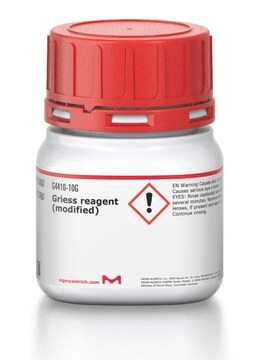H8502
Dopamine hydrochloride
≥98% (TLC), powder, neurotransmitter
Synonym(s):
2-(3,4-Dihydroxyphenyl)ethylamine hydrochloride, 3,4-Dihydroxyphenethylamine hydrochloride, 3-Hydroxytyramine hydrochloride, 4-(2-Aminoethyl)-1,2-benzenediol hydrochloride
About This Item
Recommended Products
product name
Dopamine hydrochloride,
form
powder
Quality Level
color
light tan
mp
248-250 °C (lit.)
solubility
alcohol: 20 mg/mL
H2O: soluble
storage temp.
2-8°C
SMILES string
Cl[H].NCCc1ccc(O)c(O)c1
InChI
1S/C8H11NO2.ClH/c9-4-3-6-1-2-7(10)8(11)5-6;/h1-2,5,10-11H,3-4,9H2;1H
InChI key
CTENFNNZBMHDDG-UHFFFAOYSA-N
Gene Information
human ... ADRB1(153)
Looking for similar products? Visit Product Comparison Guide
General description
Application
- to study dopamine-mediated transient modulation of the physiological responses in white leg shrimp, Litopenaeus vannamei.
- to study dopamine-mediated changes in immunity susceptibility to Lactococcus garvieae in the freshwater giant prawn, Macrobrachium rosenbergii.
- to study the molecular link between dopamine-induced oxidative stress and mHtt (mutant Huntingtin) toxicity in relation to the activation of the autophagy pathway in an ‘in vitro’ model of parkinsonian Huntington′s Disease.
- as a substrate of the prophenoloxidase (PPO) cascade reaction in the anti-microbial assay targeting methicillin-resistant staphylococcus aureus (MRSA) in the biofilm phase.
- added exogenously to the culture medium to study its effect on H. contortus female worms.
Features and Benefits
Caution
related product
Signal Word
Warning
Hazard Statements
Precautionary Statements
Hazard Classifications
Skin Sens. 1
Storage Class Code
11 - Combustible Solids
WGK
WGK 1
Flash Point(F)
Not applicable
Flash Point(C)
Not applicable
Personal Protective Equipment
Certificates of Analysis (COA)
Search for Certificates of Analysis (COA) by entering the products Lot/Batch Number. Lot and Batch Numbers can be found on a product’s label following the words ‘Lot’ or ‘Batch’.
Already Own This Product?
Find documentation for the products that you have recently purchased in the Document Library.
Customers Also Viewed
Our team of scientists has experience in all areas of research including Life Science, Material Science, Chemical Synthesis, Chromatography, Analytical and many others.
Contact Technical Service










